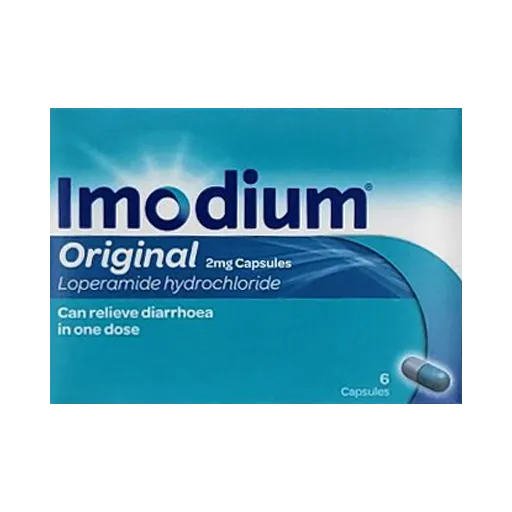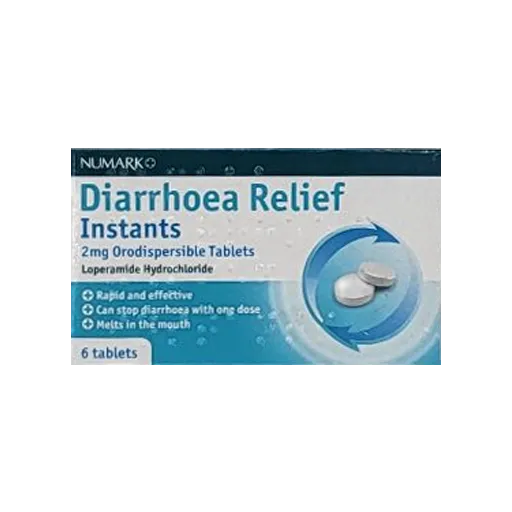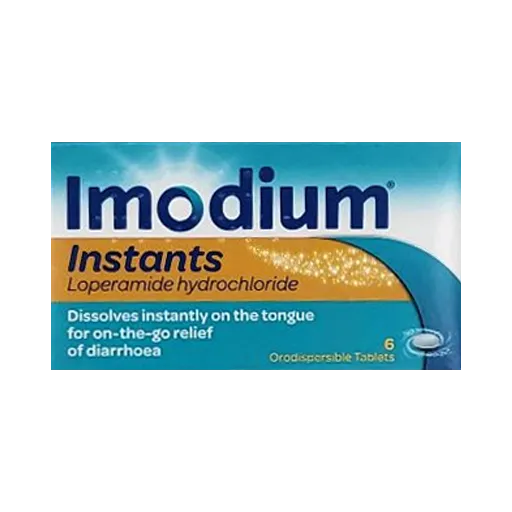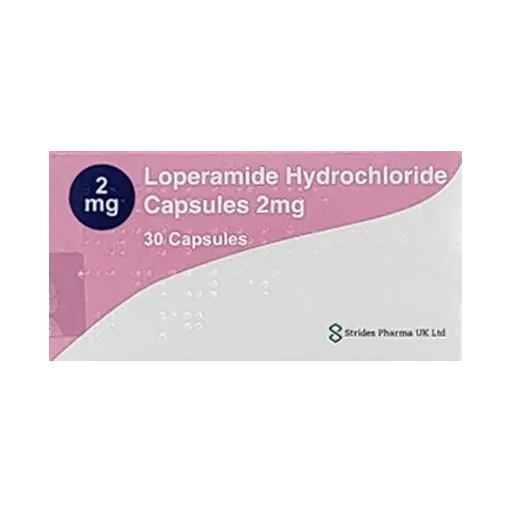
-
Works within 1 hour
-
Relieve diarrhoea
-
Next day delivery available
-
Genuine medication
-
Discreet packaging
Imodium Capsules 2mg
What it is
Imodium 2 mg capsules contain loperamide hydrochloride, a medicine used to treat short-term diarrhoea in adults and children aged 12 years and over. It works by slowing the natural movement of your intestines so that food stays in your gut longer. This helps the body absorb more water and salts (electrolytes) and makes stools firmer and less frequent. It can help you feel more comfortable and reduce the urgent need to go to the toilet.
How it works
Loperamide hydrochloride is an anti-motility agent. It acts on receptors in the gut wall to slow bowel movements and increase fluid absorption. It does not cross into the brain, so it does not cause typical opioid effects like pain relief or dependence. Most people notice an improvement within a few hours. It may also reduce cramping and the feeling of urgency associated with diarrhoea.
Buy Imodium Capsules online
Imodium is available to buy from our UK-registered pharmacy. Simply add the product to your basket and checkout securely. We offer free and next-day delivery options across the UK. Our pharmacy team sources all products from reputable wholesalers and dispenses them following clinical checks by our pharmacist and prescribing team.
How to take Imodium 2 mg Capsules
Adults and children aged 12 and over should take two capsules (4 mg) to start, followed by one capsule (2 mg) after each loose stool. Do not take more than six capsules in 24 hours. Swallow each capsule whole with water. If your diarrhoea lasts longer than 48 hours or you develop a fever, contact a doctor for advice. Avoid using for longer than two days without medical supervision.
Keep hydrated by drinking water and oral rehydration solutions such as Dioralyte sachets to replace lost fluids and electrolytes.
Who it's for
Imodium is for adults and young people aged 12 years and over with sudden (short-term) diarrhoea caused by infection, diet changes, travel, or mild food poisoning. It may also be used on medical advice for chronic diarrhoea in conditions like irritable bowel syndrome (IBS). Do not use if you have a high temperature, bloody stools, or severe tummy pain without speaking to a doctor.
Warnings & precautions
Do not take this medication if any of the following apply:
- You are allergic to loperamide hydrochloride or any capsule ingredient.
- You have ulcerative colitis flare-ups.
- You are constipated or your stomach appears swollen.
Speak to your doctor or pharmacist before use if you:
- Have liver problems.
- Have HIV and your stomach is swollen.
- Are pregnant, breastfeeding, elderly or have a long-term health condition.
If symptoms persist, or if you develop a fever or blood in your stools, stop taking it immediately and seek medical advice. Taking more than the recommended dose can cause serious side effects such as abnormal heart rhythms or changes to your heart rhythm. Always follow the dose instructions carefully.
Possible side effects
Most people will take this medication without problems, but side effects can occur. Common side effects include:
- Tummy pain or cramps
- Constipation
- Bloating or gas
- Dry mouth
- Nausea
- Drowsiness or dizziness
- Headache
Rare side effects include:
- Allergic reactions such as rash, itching, swelling or difficulty breathing
- Severe constipation or abdominal swelling
- Abnormal heart rhythms (fast, irregular or pounding heartbeat)
- Fainting or chest pain (seek medical help immediately)
If you experience any side effects, especially those affecting your heart rhythm or breathing, stop taking Imodium and contact a healthcare professional.
If you experience drowsiness or dizziness, do not drive or operate machinery until you feel well again.
Causes of diarrhoea
Diarrhoea has many causes, including infections (bacterial, viral or parasitic), food poisoning, lactose intolerance, coeliac disease, inflammatory bowel disease, and medicines such as antibiotics and laxatives. If you think your diarrhoea is caused by infection, wash your hands regularly and avoid preparing food for others until you are well. Stay off work or school until you have been symptom-free for at least two days.
Imodium and food poisoning
Medicines that stop diarrhoea (such as Imodium) can help ease symptoms in adults, but they are not suitable for everyone. It is not suitable for children under 12 years, and avoid it if you have a high fever, blood or mucus in your stools, severe tummy pain, or symptoms after taking antibiotics (these can be signs of a more serious infection). Focus on fluids and oral rehydration salts to prevent dehydration, rest, and good hand hygiene. If symptoms last longer than 48 hours, if you are very unwell, elderly, pregnant, have long-term health problems, or have recently travelled abroad, seek medical advice. Stay off work or school and avoid preparing food for others until you've been symptom-free for 48 hours.
Other ways to help diarrhoea
Keep hydrated by drinking plenty of water or rehydration solutions. Avoid caffeine, alcohol and fizzy drinks as they can make diarrhoea worse. Eat small, light meals such as toast, rice or bananas until you feel better. Rest as much as possible and use paracetamol if needed for pain or fever. Avoid spicy or fatty foods until your bowels settle.
Who cannot take Imodium
Do not take Imodium if you:
- Have ever had an allergic reaction to loperamide hydrochloride or any ingredient in the capsules.
- Are experiencing severe diarrhoea after taking antibiotics.
- Are having a flare-up of ulcerative colitis or other inflammatory bowel conditions.
- Are constipated or your stomach appears swollen.
Speak to your doctor before taking if you:
- Have liver problems.
- Have HIV and notice your stomach becoming swollen.
- Have blood in your stools or a high temperature (these could be signs of dysentery).
- Have had diarrhoea for more than 48 hours.
- Are pregnant, trying to get pregnant, or breastfeeding.
- Are over 40 and your diarrhoea or IBS symptoms are different from usual.
- Have recently travelled abroad (you may have picked up a stomach infection).
If you have diarrhoea and IBS, seek medical advice if your symptoms change or persist longer than normal.
Pregnancy & breastfeeding
There is limited information about using Imodium during pregnancy, so it is best to talk to your doctor before taking it. During breastfeeding, a small amount of loperamide may pass into breast milk, but it is unlikely to harm a healthy infant. If you notice changes such as sleepiness or feeding difficulty in your baby, contact your doctor or health visitor.
Interactions
Loperamide can interact with certain other medicines, so always tell your doctor or pharmacist before use if you take:
- Clozapine (used to treat schizophrenia).
- Dronedarone (for heart rhythm problems).
- Tepotinib (for lung cancer).
- Velpatasvir (for hepatitis C infection).
Also inform your healthcare professional if you take any herbal or complementary remedies. Combining Imodium with other medicines that slow the gut can increase the risk of constipation or bowel blockage. Avoid taking more than the recommended dose, as this can lead to serious side effects such as abnormal or irregular heart rhythms.
More information
For the full product details, including dosage, side effects and clinical data, see the Summary of Product
Characteristics (SPC).
You can also visit the NHS page on loperamide
for advice on safe use and self-care for diarrhoea.
Frequently Asked Questions (FAQ)
-
How quickly does Imodium work?
Most people notice relief within one hour. If your symptoms do not improve after two days, speak to a doctor for advice.
-
Can I drink alcohol while taking Imodium?
It's best to limit alcohol, as it can make side effects like drowsiness or dizziness worse and slow your recovery.
-
Is Imodium addictive?
When taken as directed and for short-term use, it is not addictive. Do not exceed the recommended dose or use it for long periods without medical advice.
-
Can I drive while taking Imodium?
It does not usually affect driving, but some people may feel drowsy or dizzy. If this happens, avoid driving or using machinery until you feel well.
-
Can I take Imodium during pregnancy?
It is best to avoid when pregnant unless advised by a doctor. They may recommend other ways to control diarrhoea and prevent dehydration.
-
How long does Imodium last?
Relief often starts within 1 hour and the effect can last several hours. Continue to follow the dose guidance and do not use for more than 48 hours without speaking to a doctor. If diarrhoea continues or you develop fever or blood in stools, seek medical advice.
-
How often can you take Imodium?
Adults and children 12+ should take two capsules (4 mg) to start, then one capsule (2 mg) after each loose stool. Do not take more than six capsules in 24 hours. Keep well hydrated and stop if constipation occurs. If symptoms last longer than 48 hours, speak to a doctor.
-
Does Imodium help with nausea?
While it does not treat nausea directly, easing diarrhoea may help you feel more comfortable. For nausea, sip clear fluids or oral rehydration solutions, rest, and avoid heavy or greasy foods. If you have ongoing vomiting, signs of dehydration, severe tummy pain, or symptoms lasting more than 48 hours, seek medical advice.



